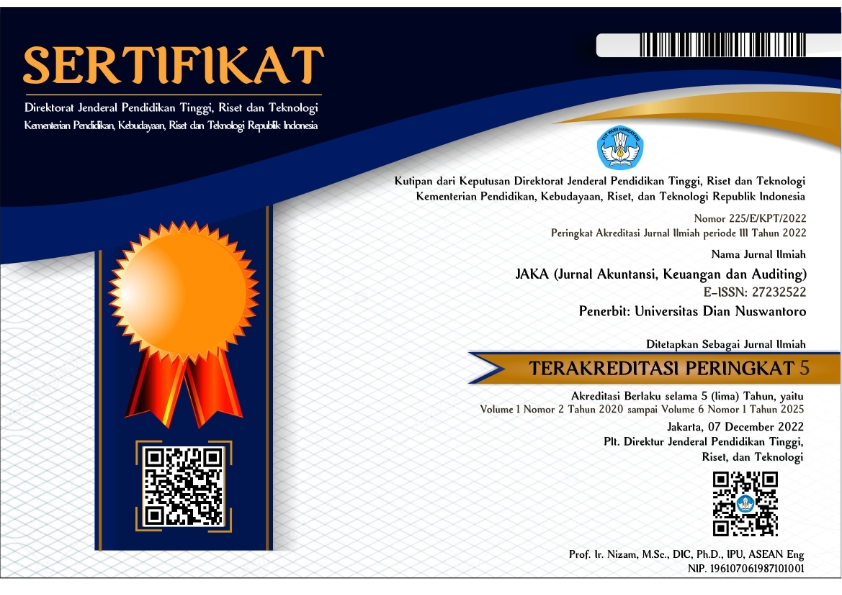Pengaruh Free Cash Flow Dan Pertumbuhan Perusahaan Terhadap Kebijakan Hutang (Studi Kasus Pada Perusahaan LQ 45 Di Bursa Efek Indonesia Tahun 2018-2021)
DOI:
https://doi.org/10.56696/jaka.v5i1.10771Abstract
Debt policy is a policy carried out by a company to obtain funding sources that come from outside the company. It is important for management to make funding decisions for a company, because these decisions can affect the value of a company and thus have an impact on the prosperity of the company owner or share owners. The aim of this research is to examine the influence of free cash flow and company growth on debt policy at LQ 45 Companies on the Indonesia Stock Exchange in 2018-2021. The method used in this research is a quantitative method with purposive sampling technique. The analysis used in this research is descriptive statistical analysis and multiple linear regression analysis. The research results show that partially free cash flow has a positive effect on debt policy because it has a probability value of 0.0004 which is smaller than 0.05, company growth has no effect on debt policy because it has a probability value of 0.5930 which is greater than 0.05. Meanwhile, simultaneously free cash flow and company growth together influence debt policy because they have a probability value of 0.004000 which is smaller than 0.05.References
ABBAS, A. (2017). Ekonomi Islam Dan Pemberdayaan Ekonomi Rakyat. Dialog, 32(1), 117–131. https://doi.org/10.47655/dialog.v32i1.132
Aziz, N. L. L. (2016). Otonomi Desa dan Efektivitas Dana Desa. Jurnal Penelitian Politik, 13(2), 193–211. https://doi.org/10.14203/JPP.V13I2.575
Erawati, T., & Parera, A. M. W. (2017). Pengaruh Kesadaran Wajib Pajak, Sanksi Perpajakan, Pengetahuan Perpajakan, Dan Pelayanan Fiskus. Jurnal Akuntansi, 5(1), 37. https://doi.org/10.24964/ja.v5i1.255
Hulu, Y., Harahap, R. H., & Nasutian, M. A. (2018). Pengelolaan Dana Desa dalam Pemberdayaan Masyarakat Desa. Jupiis: Jurnal Pendidikan Ilmu-Ilmu Sosial, 10(1), 146. https://doi.org/10.24114/jupiis.v10i1.9974
Informatika, I. J. (2020). INFOTECH: Jurnal Informatika & Teknologi. 1, 43–55.
Mada, S., Kalangi, L., & Gamaliel, H. (2017). Pengaruh Kompetensi Aparat Pengelola Dana Desa, Komitmen Organisasi Pemerintah Desa, dan Partisipasi Masyarakat Terhadap Akuntabilitas Pengelolaan Dana Desa Di Kabupaten Gorontalo. Jurnal Riset Akuntansi Dan Auditing “Goodwill,” 8(2), 106–115. https://doi.org/10.35800/jjs.v8i2.17199
Moonti, R. M., & Kadir, Y. (2018). Pencegahan Korupsi Dalam Pengelolaan Dana Desa. Jurnal IUS Kajian Hukum Dan Keadilan, 6(3), 430. https://doi.org/10.29303/ius.v6i3.583
Nafiah, Z. ., & Warno, W. . (2018). Pengaruh Sanksi Pajak, Kesadaran Wajib Pajak, Dan Kualitas Pelayanan Pajak Terhadap Kepatuhan Wajib Pajak Dalam Membayar Pajak Bumi Dan Bangunan (Study Kasus Pada Kecamatan Candisari Kota Semarang Tahun 2016). Jurnal Stie Semarang, 10(1), 86–105. https://doi.org/10.33747/stiesmg.v10i1.88
Subroto, A. (2009). Akuntabilitas Pengelolaan Dana Desa ( Studi Kasus Pengelolaan Alokasi Dana Desa Di Desa-Desa Dalam Wilayah Kecamatan Tlogomulyo Kabupaten Temanggung Tahun 2008). Program Studi Magister Sains Akuntansi Program Pasca Sarjana Universitas Diponegoro Semarang, 1–109.
Wida, S. A., Supatmoko, D., & Kurrohman, T. (2017). Akuntabilitas Pengelolaan Alokasi Dana Desa ( ADD ) di Desa – Desa Kecamatan Rogojampi Kabupaten Banyuwangi (The Accountability in the Management of the Village Fund Allocation in Villages at Rogojampi District , Banyuwangi Regency). E-Journal Ekonomi Bisnis Dan Akuntansi, IV(2), 148–152.
Published
How to Cite
Issue
Section
License
Copyright (c) 2024 JAKA (Jurnal Akuntansi, Keuangan, dan Auditing)

This work is licensed under a Creative Commons Attribution-ShareAlike 4.0 International License.













